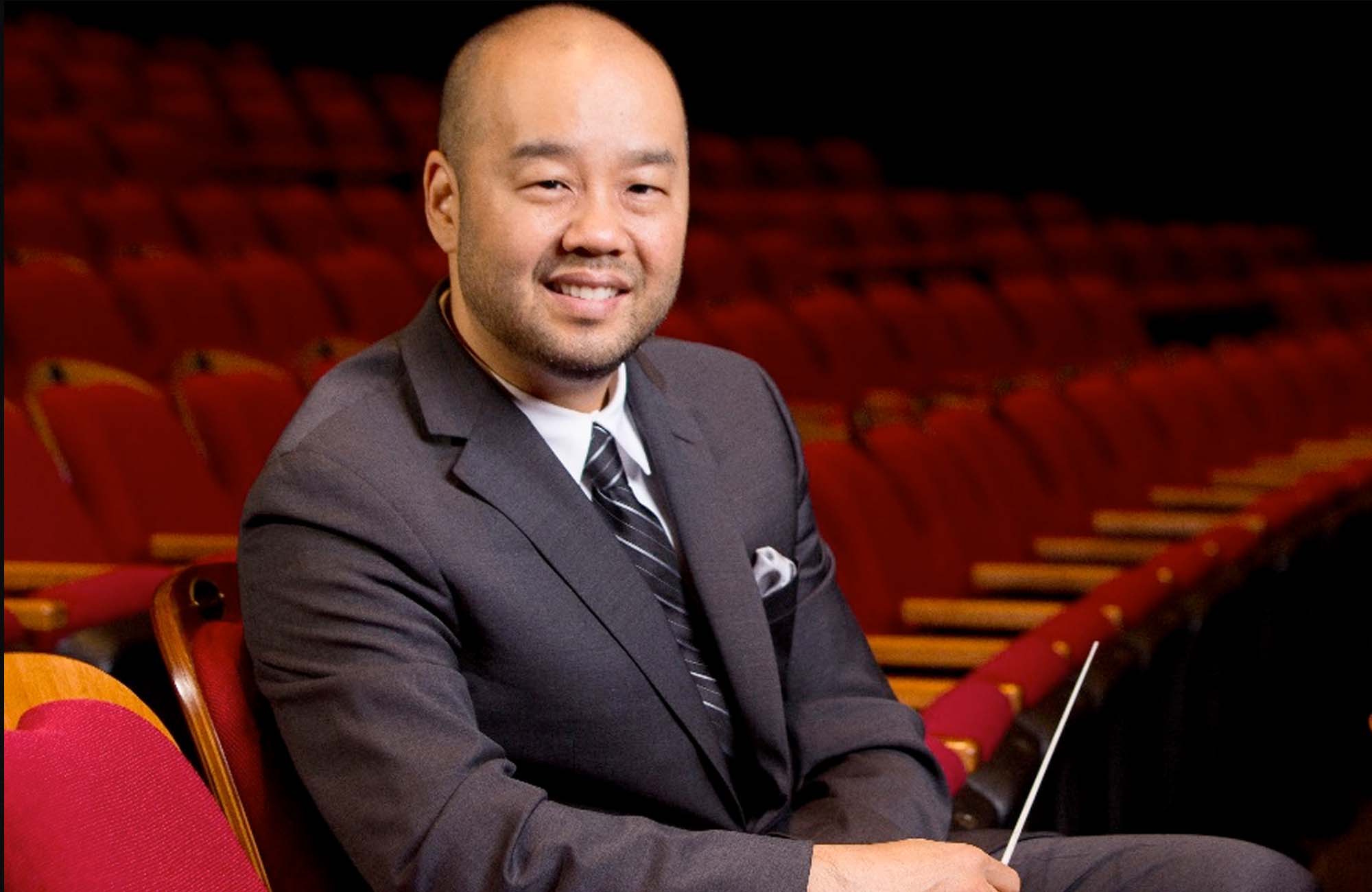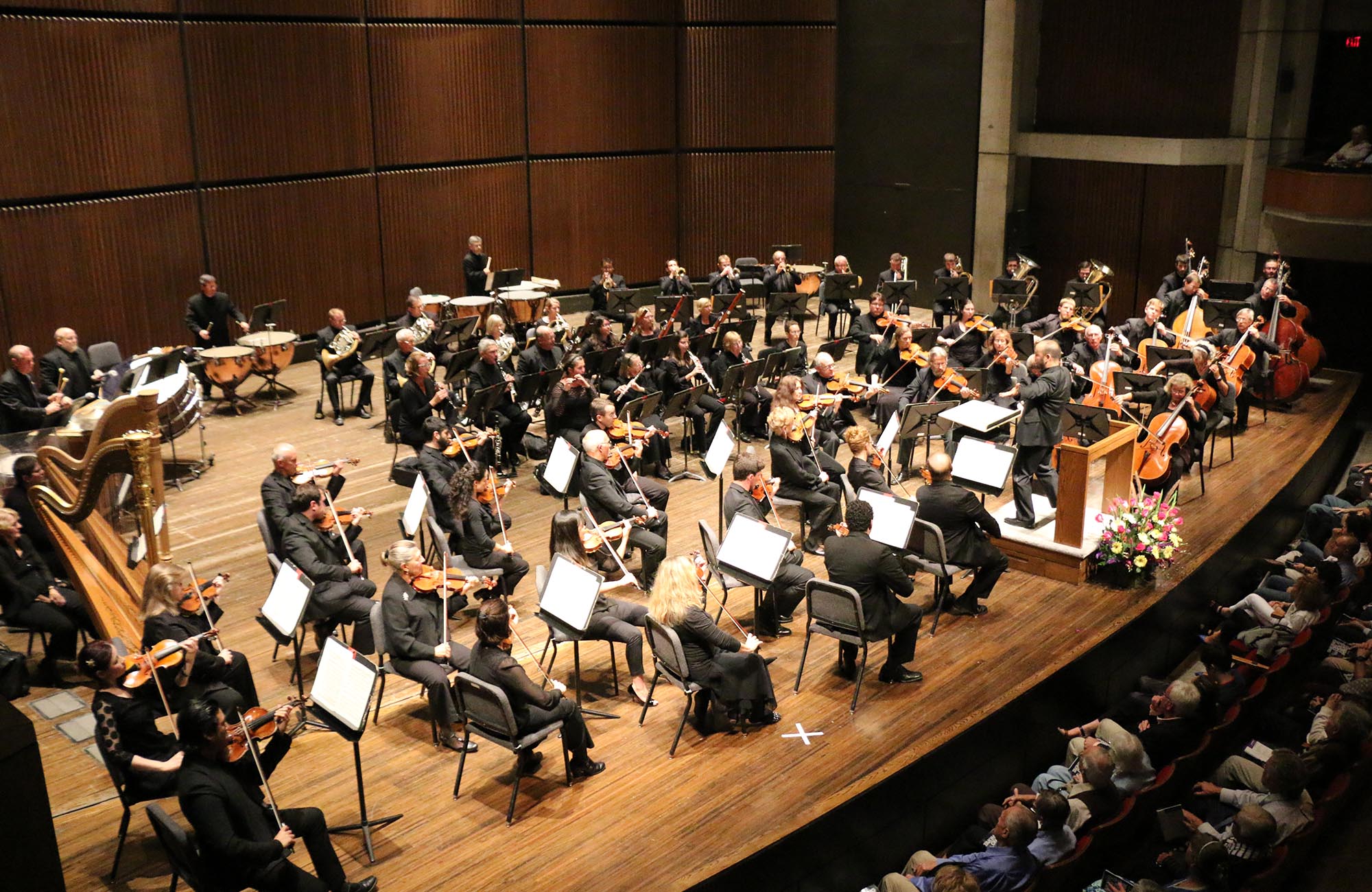PROGRAM
Performed on March 3, 2018 at Course Hinds Theater
Lawrence Loh conducting
Alexander Borodin
In the Steppes of Central Asia
Performed on May 13, 2017 at Crouse Hinds Concert Theater
Philippe Quint, violin; Lawrence Loh conducting
Samuel Barber
Violin Concerto, op. 14
Performed on May 13, 2017 at Crouse Hinds Concert Theater
Lawrence Loh conducting
Gustav Mahler
Symphony No.1 in D major (Titan)
PROGRAM NOTES
The concert opens with a similarly celestial piece, Rainbow Body by the American composer Christopher Theofanidis (b. 1967). Written in 2000, it’s been so widely performed and so warmly embraced by listeners that it has become, in conductor Larry Loh’s words, a “modern classic.” The composer tells us that the work has a double inspiration. First, there’s his fascination with the music by the medieval philosopher and composer Hildegard von Bingen (1098–1179): the work is based on the chant “Ave Maria, o auctrix vite,” which appears clearly several times in the piece and which more subtly generates the musical ...
The concert opens with a similarly celestial piece, Rainbow Body by the American composer Christopher Theofanidis (b. 1967). Written in 2000, it’s been so widely performed and so warmly embraced by listeners that it has become, in conductor Larry Loh’s words, a “modern classic.” The composer tells us that the work has a double inspiration. First, there’s his fascination with the music by the medieval philosopher and composer Hildegard von Bingen (1098–1179): the work is based on the chant “Ave Maria, o auctrix vite,” which appears clearly several times in the piece and which more subtly generates the musical material elsewhere. (To make it easier to hear, we’ll precede the Rainbow Body with a performance of the chant itself.) Second, and more directly relevant to the Holst, there’s what the composer calls “the Tibetan Buddhist idea of ‘Rainbow Body,’ which is that when an enlightened being dies physically, his or her body is absorbed directly back into the universe as energy, as light.” As with The Planets, though, you don’t need much background to appreciate Rainbow Body, which shares Holst’s dramatic immediacy and orchestral brilliance (Larry points, among other things, to the way Theofanidis uses trombones to suggest “deep space”).
Our centerpiece, the Rhapsody on a Theme of Paganini by Sergei Rachmaninoff (1873–1943), is the one work on the program without a cosmic connection. But it does have the same kind of perennial popularity that The Planets does; and it does, like Rainbow Body, build on pre-existing musical material. In this case, the composer, arguably the greatest pianist of the 20th century, offers up an homage to the greatest violinist of the 19th, Nicolò Paganini (1782-1840), using the familiar 24th Caprice as his starting point. (Rachmaninoff’s work can also, less directly, be seen as an homage to the greatest pianist of the 19th century, Franz Liszt, who also recast Paganini’s virtuosic violin music for piano).
After intermission comes the Symphony No. 9 (“From the New World”) by Antonín Dvořák (1841–1904). Dvořák, of course, was Czech, not American, but “American” music has always had an international flavor. We are, after all, a nation of immigrants, and our musical life has been enriched by the presence of composers like Rachmaninoff, Stravinsky, Bartók, Schoenberg, and Korngold. Beyond that, many of our best U.S.-born composers had European training (especially in 20th century Paris); and even the first composer to gain an international reputation as “American,” Louis Moreau Gottschalk, took his inspiration as much from Latin America as from the United States.
In any case, the Czech Dvořák had a profound influence on American music during his years in the United States, 1892–95, as head of the National Conservatory of Music in New York. In fact, it was Dvořák, during his time here, who was most vociferous about the need for American composers to look to the folk music of their own country, rather than to Europe, for inspiration. In part because of that, in part due to early encouragement from Dvořák himself, critics have sought out the American sources for the Symphony No. 9, especially themes from the African-American and Native American traditions—and they’ve found evidence in apparent references, say, to “Sweet Low, Sweet Chariot,” “Turkey in the Straw,” and other tunes.
But how much Americana really haunts the score? It’s certainly true that the gorgeous theme of the slow movement maps onto the spiritual “Goin’ Home”—but that’s because the spiritual was written by Dvořák’s student William Arms Fisher after the symphony, and was specifically based on it. There’s no doubt, too, that Dvořák was partly inspired by Longfellow’s The Song of Hiawatha (in fact, some of the music in the symphony was drawn from unfinished ideas for an opera based on that poem). Even so, there’s no authentic Native music in the score. In any case, later in his life, Dvořák insisted that he borrowed the spirit of American music rather than its substance—and in retrospect, the symphony sounds increasingly Czech. Indeed, especially given its quiet ending, it seems as nostalgic for the Old World as it is enthusiastic about the New. However you interpret it, though, it has remained one of the most beloved symphonies in the repertoire since its premiere. And rightly so.
Peter J. Rabinowitz
Have any comments or questions? Please write to me at prabinowitz@ExperienceSymphoria.org
FEATURED ARTISTS

Described as bringing an “artisan storyteller’s sensitivity… shaping passages with clarity and power via beautifully sculpted dynamics… revealing orchestral character not seen or heard before” (Arts Knoxville) Lawrence Loh enjoys a dynamic career as a conductor of orchestras all over the world.
After an extensive two ...
Described as bringing an “artisan storyteller’s sensitivity… shaping passages with clarity and power via beautifully sculpted dynamics… revealing orchestral character not seen or heard before” (Arts Knoxville) Lawrence Loh enjoys a dynamic career as a conductor of orchestras all over the world.
After an extensive two year search, Lawrence Loh was recently named Music Director of the Waco Symphony Orchestra beginning in the Spring of 2024. Since 2015, he has served as Music Director of The Syracuse Orchestra (formerly called Symphoria), the successor to the Syracuse Symphony Orchestra. “The connection between the organization and its audience is one of the qualities that’s come to define Syracuse’s symphony as it wraps up its 10th season, a milestone that might have seemed impossible at the beginning,” (Syracuse.com) The Syracuse Orchestra and Lawrence Loh show that it is possible to create a “new, more sustainable artistic institution from the ground up.”
Appointed Assistant Conductor of the Pittsburgh Symphony in 2005, Mr Loh was quickly promoted to Associate and Resident Conductor within the first three years of working with the PSO. Always a favorite among Pittsburgh audiences, Loh returns frequently to his adopted city to conduct the PSO in a variety of concerts. Mr. Loh previously served as Music Director of the West Virginia Symphony Orchestra, Music Director of the Northeastern Pennsylvania Philharmonic, Artistic Director and Principal Conductor of the Syracuse Opera, Music Director of the Pittsburgh Youth Symphony Orchestra, Associate Conductor of the Dallas Symphony Orchestra, Associate Conductor of the Colorado Symphony Orchestra and Music Director of the Denver Young Artists Orchestra.
Mr. Loh’s recent guest conducting engagements include the San Francisco Symphony, Dallas Symphony, North Carolina Symphony, Baltimore Symphony, Sarasota Orchestra, Florida Orchestra, Pensacola Symphony, Atlanta Symphony, National Symphony, Detroit Symphony, San Diego Symphony, Seattle Symphony, National Symphony (D.C.), Utah Symphony, Rochester Philharmonic, Indianapolis Symphony, Calgary Philharmonic, Buffalo Philharmonic, Albany Symphony and the Cathedral Choral Society at the Washington National Cathedral. His summer appearances include the festivals of Grant Park, Boston University Tanglewood Institute, Tanglewood with the Boston Pops, Chautauqua, Sun Valley, Shippensburg, Bravo Vail Valley, the Kinhaven Music School and the Performing Arts Institute (PA).
As a self-described “Star Wars geek” and film music enthusiast, Loh has conducted numerous sold-out John Williams and film music tribute concerts. Part of his appeal is his ability to serve as both host and conductor. “It is his enthusiasm for Williams’ music and the films for which it was written that is Loh’s great strength in this program. A fan’s enthusiasm drives his performances in broad strokes and details and fills his speaking to the audience with irresistible appeal. He used no cue cards. One felt he could speak at filibuster length on Williams’ music.” (Pittsburgh Tribune)
Mr Loh has assisted John Williams on multiple occasions and has worked with a wide range of pops artists from Chris Botti and Ann Hampton Callaway to Jason Alexander and Idina Menzel. As one of the most requested conductors for conducting Films in Concert, Loh has led Black Panther, Star Wars (Episodes 4-6), Jaws, Nightmare Before Christmas, Jurassic Park, Casablanca, The Wizard of Oz and Singin’ in the Rain, among other film productions.
Lawrence Loh received his Artist Diploma in Orchestral Conducting from Yale, his Masters in Choral Conducting from Indiana University and his Bachelor of Arts from the University of Rochester. Lawrence Loh was born in southern California of Korean parentage and raised in Carlisle, Pennsylvania. He and his wife Jennifer have a son, Charlie, and a daughter, Hilary. Follow him on instagram @conductorlarryloh or Facebook at @lawrencelohconductor or visit his website, www.lawrenceloh.com


